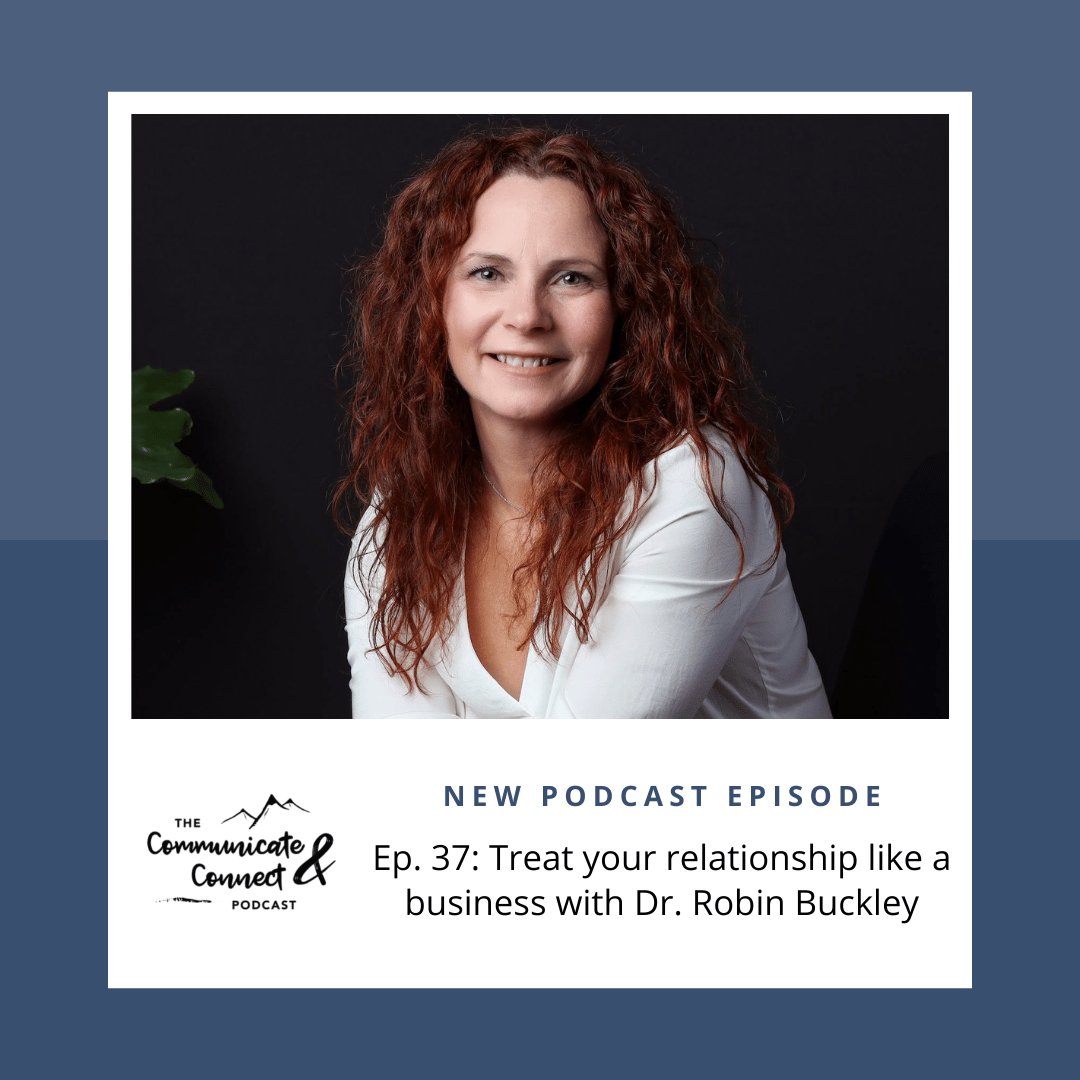|
Treating your relationship like a business can help you get on the same page with your partner. In this podcast episode, Elizabeth Polinsky interviews Dr. Robin Buckley on business strategies that can be helpful for couple relationships.
IN THIS PODCAST
Introduction to Dr. Robin Buckley
Dr. Buckley has a background in psychology and has a PhD in psychology. She now works as a couples coach. She loves helping people who come in for assistance before they are in a crisis.
Before this, she would work with business women and helping them with their careers and professional plans. She found that women who could deal with conflict well at work would still struggle to do this at home with their spouse. So she started helping women transfer their work skills to their relationship. The difference between marriage counseling and couples coaching
Couples coaching is a new model. Dr. Buckley come up with her own method of couples counseling. Couples counseling focuses on healing from the past. In cases where there is infidelity, addiction, abuse, or loss, these are issues that can impact a couple at a much deeper level where working with a trained couples therapist is helpful. In her view, coaching is a preventative and proactive approach to building the relationship they want. In coaching you talk about what is working well, and creating a plan for the future.
When it comes to coaching, you want to make sure you vet who you are working with. Make sure to get an idea of their professional background and that they have completed a specific certified coaching program that has been approved by ICF - the International Coaching Federation. The business model that she uses when coaching couples
She has a proprietary model to try to help people separate thier emotionality from their words. Strategies she uses include switching everyday language to business language:
While emotion has a place in the relationship, she believes that in business meeting you don't get emotional. Through these business meeting, she helps couples create a business plan for their relationship along with key performance indicators. Couples go through weekly meetings, and quarterly reviews of their business plan. Liz has done this in the past for her personal life as well. This was based on the book "The On Purpose Person", where you create a mission state, a vision statement, and create a strategic plan for the next 1, 3, 5 years. While Liz hasn't done this in a relationship, she loves doing this for her personal life and loves it. She uses this approach every 1-2 years to stay on track with life goals. One of the first things Robin does is helps couples create a mission statement for their relationship. This can help couples feel more on the same page and get on the same page together. Having a plan together this makes the decision about life and money etc., so much easier. Some of her couples make a financial spending plan, or a financial decision tree/ flow chart to help them make decisions. When we think about how much time and money most couples spend on planning their wedding, a 6 hours event, its about 250 hours and $25,000. How long have they spent on planning the decades long marriage?" Dr. Robin Buckley How a business approach can be helpful for military relationships
Having a business approach to can fit well into military life and relationships as military service members are often very used to having a strategic plan to follow and getting everyone on the same page. Almost always, there is a debrief after a military mission to assess how things went and how they can be improved.
But how do you do this when there is a deployment or times where you are separated for a long time? In her work with military families, it hasn't been that different. If there is enough time before a deployment, you can create a plan for what communication will look like. You can create a plan, a back up plan, and a secondary back up plan. If there isn't advanced notice, then couples can create a "bug out" plan that can be pulled out of the drawer at a moments notice. This type of plan can be helpful for times when there isn't time to create a plan on the spot. Having a plan helps create a level of comfort and security. It's also helpful to have a plan for when the service member comes home from deployment. Having a transition plan to ease the service member back into family life is something that she would recommend to military couples. This can help you get back on the same page with each other. Having a debrief 2-4 weeks after coming home to assess how the transition plan is going. If you need to make an addendum to plan, that's totally fine! You create the business plan so you can have the fairy tale." -- Dr. Robin Buckley Tips & Take-aways from Dr. Robin Buckley
1. Schedule things on a couples calendar (including sex!).
2. Create a mission statement with your partner.
Sign up for Liz's FREE Relationship Email Course!
Liz's Useful Links:
Podcast Sponsor: The Relate Assessment is the most comprehensive relationship assessment in the world and is based on 10 predictors of marital stability. It’s supported by the American Association for Marriage and Family Therapy and is the one my husband and I used during our premarital couples counseling. To get 20% off the assessment, go to https://relateinstitute.com/ and enter “POLINSKY20”. Thanks for listening! 
Elizabeth Polinsky is a marriage and couple therapist specializing in working with military members, veterans, and their families. Liz has offices in Virginia Beach, Virginia, and Fallon, Nevada, and also provides online counseling services throughout Virginia, Nevada, South Carolina, and Arkansas.
DISCLAIMER: My podcast, blogs, videos, newsletters, and products are general information for educational purposes only; they are not psychotherapy and not a replacement for therapy. The information provided does not constitute the formation of a therapist-patient relationship. You should consult your doctor or mental health provider regarding advice and support for your health and well being. I cannot answer questions regarding your specific situation. If you are experiencing a medical or mental health emergency, you should call 911, report to your local ER, or call the National Crisis Hotline at 1-800-273-8255. Nothing I post should be considered professional advice. The information in my podcast, blogs, videos, newsletters, and products are not intended to be therapy or psychological advice. The podcast, blogs, videos, newsletters, and products are not a request for a testimonial, rating, or endorsement from clients regarding counseling. If you are a current or former client/ patient, please remember that your comments may jeopardize your confidentiality. I will not “friend” or “follow” current or past clients to honor ethical boundaries and privacy; nor will I respond to comments or messages through social media or other platforms from current or past clients. Current and past client’s should only contact me through the professional contact information provided on the website. Lastly, accounts may be managed by multiple people. Therefore, comments and messages are monitored by staff and are not confidential.
0 Comments
Your comment will be posted after it is approved.
Leave a Reply. |
The Communicate & Connect Podcast
In Communicate & Connect For Military Relationships, I provide educational tips for relationships, communication, and navigating military family life. AuthorHey, I'm Dr. Elizabeth "Liz" Polinsky and I am a marriage counselor in Virginia Beach. I provide online counseling across the states of VA, MD, NC, SC, AR, and NV. Categories
All
|
Telephone(757) 354-1157
|
liz@communicateandconnectpodcast.com
|




 RSS Feed
RSS Feed
